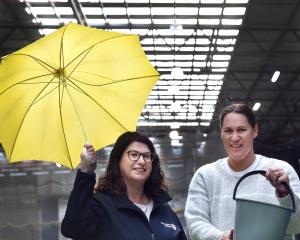''Vaping'' is on the rise in Dunedin, but a University of Otago researcher is concerned the tobacco alternative could act as a ''gateway drug'' for the real thing.
Opinion is divided on the use of e-cigarettes, which simulate smoking by vaporising a liquid solution which often contains nicotine. Users hail them as a safer alternative to tobacco, and a quitting aid.
But critics are concerned not enough is known about the health effects of e-cigarettes, also known as vaporisers or vapes, and the potential they could act as a ''gateway drug'' for the real thing.
The Southern District Health Board is preparing to ban people from using them on its property.
Dunedin ''vapers'' Shaye Kirk and Owen Butler said the practice was growing in the city. Both of them still smoked, but using vaporisers allowed them to cut down and save money and both were certain it was healthier than smoking tobacco.
They and other users got around Ministry of Health regulations, making it illegal to sell liquid solutions containing nicotine domestically, by importing it from overseas, which was legal, as long as it was for personal use.
''I am quite a heavy chain-smoker and I'd go through 100 bucks worth of durries a week,'' Mr Kirk said.
By comparison, more than a week's worth of e-cigarette liquid - known as e-juice - cost between $10 and $15 for a heavy user.
Mr Butler said vaping had become ''really popular over the last year'' in Dunedin, but was still nowhere near as widespread as in North America, where there were specialised shops dealing in the product.
University of Otago marketing professor Janet Hoek was cautious about vaping and about to carry out research to get a better idea as to the way New Zealanders used the product.
She supported the Ministry of Health's approach to e-cigarettes and believed more evidence was needed before a change in regulations was considered.
''I think it's always very difficult to put a genie back in the bottle, once it's been allowed out.''
Questions that needed answering included whether e-cigarettes - and the multitude of e-juice flavours available - could act as a ''gateway'' to smoking traditional cigarettes.
Another potential problem was dual use.
''In other words, instead of helping people to quit smoking altogether, there is some evidence from the United States and Korea that suggests people are becoming less likely to quit if they use e-cigarettes.''
More New Zealand-based data was needed to answer these questions.
''At the moment, we don't have a lot of New Zealand data about e-cigarette use and our study, we hope, will be the first in a continuing series of studies.''
In the meantime, she advised people not to use e-cigarettes.
Prof Hoek hoped, as part of her research, to speak to 20 Dunedin people who used the product. Anyone interested in taking part could contact Christina Yeates, at christina.yeates@otago.ac.nz.
SDHB settings and lifestyle team leader Anne McSoriley said the board was in the process of banning e-cigarette use on its grounds as part of a review of its smoke-free policy.
''The policy is just waiting sign off by the senior executive,'' she said.
National Poisons Centre toxicologist Dr Leo Schep said it had received four calls on the issue of e-cigarettes, but none had been serious.
One involved a child potentially ingesting a small amount of e-juice and another involved a cat.
''It's not huge on our radar,'' Dr Schep said.
However, there was a risk of nicotine poisoning for people who ingested the fluid and users were advised to keep their equipment out of children's reach.
E-cigarettes
• Vary in shape and size, with designs ranging from imitation cigarettes to larger box or pipe-shaped models.
• Work by vaporising a liquid solution, which usually contains nicotine, which is then inhaled by the user.
• Invented by a Chinese pharmacist in 2003.
• Users are hailing them as a healthier alternative to cigarettes, but the jury is still out on how safe they are.
• Their popularity has grown worldwide to the point where Action on Smoking and Health recently estimated the numbers of users in the United Kingdom had grown from 700,000 in 2012 to 2.1 million this year.
Advertisement













